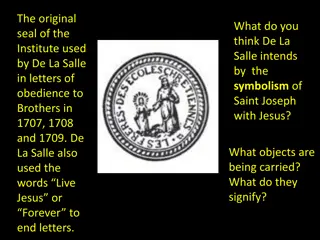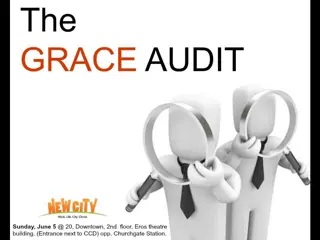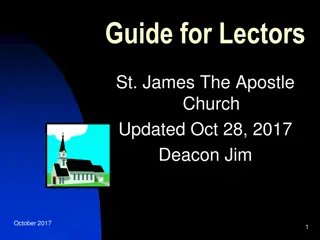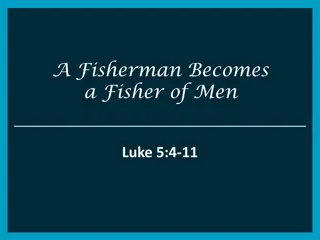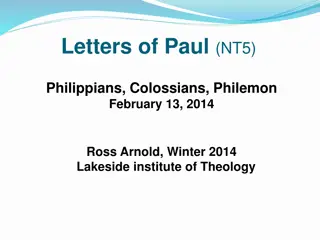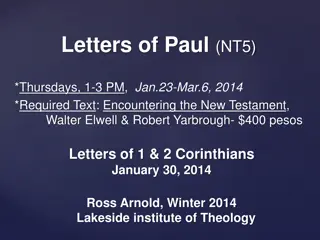Life and Legacy of Saint Peter, the Apostle
Saint Peter, also known as Simon Peter, was one of Jesus' closest companions and became a prominent Christian leader in the first century. He was a fisherman turned gifted preacher and bold leader, known for his impetuous nature and decisive actions. Peter was instrumental in spreading the teachings of Jesus, being the first to acknowledge Him as the Messiah. Despite facing persecution and hardships, Peter's faith remained steadfast, making significant contributions to early Christianity.
Download Presentation

Please find below an Image/Link to download the presentation.
The content on the website is provided AS IS for your information and personal use only. It may not be sold, licensed, or shared on other websites without obtaining consent from the author.If you encounter any issues during the download, it is possible that the publisher has removed the file from their server.
You are allowed to download the files provided on this website for personal or commercial use, subject to the condition that they are used lawfully. All files are the property of their respective owners.
The content on the website is provided AS IS for your information and personal use only. It may not be sold, licensed, or shared on other websites without obtaining consent from the author.
E N D
Presentation Transcript
Peter Peter The Apostle Peter (also known as Saint Peter, Simon Peter, and Cephas) was one of the 12 main Disciples and along with James and John, he was one of Jesus closest companions. After the resurrection, Peter became one of the most influential Christian leaders in the first century, and according to Catholic tradition, he was also the first pope.
The Synoptic Gospels (Matthew, Mark, and Luke) record that Jesus came to Peter s house, where his mother-in-law was sick with a fever. The account is incredibly brief, but it does tell us that Peter had a wife, a detail which is somewhat corroborated by Paul in 1 Corinthians 9:5:
Peter was a fisherman by trade, along with his brother Andrew (also a disciple of Jesus), but he grew into a gifted preacher and bold leader. In the gospels, he s portrayed as impetuous, always speaking his mind and acting on impulse. In the Book of Acts, Peter s decisiveness transformed him into someone the early Christians constantly relied on and turned to. While Peter didn t write any of the four gospels himself, he plays a major role in all of them, and tradition holds that the Gospel of Mark records Peter s account of Jesus ministry through his companion, John Mark.
Peter was among the first disciples called by Jesus and he was frequently their spokesman for good or bad. One thing that he is credited with is the special insight that he had concerning Jesus identity. Peter was the first to call Jesus the Son of the Living God the Messiah (Mark 8:29, Luke 9:20, Matt. 16:16-17). When Jesus called him, Peter knew that He was of God and felt unworthy to be in Jesus presence (Luke 5:6-8). Even so, Jesus did not hesitate and told Peter and Andrew that He would make them fishers of men (Mark 1:17).
Peter was the first one to preach on the day of Pentecost after the coming of the Holy Spirit and he was the first one to proclaim Christ to a Gentile. He was one of the boldest apostles of all. He willingly suffered persecution, imprisonment, beatings, and even rejoiced at the fact that he was worthy to suffer disgrace for the Lord s sake (Acts 5:41).
1 Peter, Where are we? 1 Peter, Where are we? In this letter, Peter spoke much about persecution, which anticipated the persecution he and other Christians would endure in the final years of Nero s reign. At the time he wrote, Peter had not yet been arrested, an event that would lead to his martyrdom around AD 66 68. First Peter 5:13 indicates that Peter sent greetings from the local church calling it Babylon but it s most likely that the apostle was writing in a common metaphor there. He used the name of the ancient Mesopotamian city as a stand-in for Rome
Peter, an apostle of Jesus Christ, To those who reside as aliens, scattered throughout Pontus, Galatia, Cappadocia, Asia, and Bithynia, who are chosen - - I Peter 1:1 I Peter 1:1
according to the foreknowledge of God the Father, by the sanctifying work of the Spirit, to obey Jesus Christ and be sprinkled with His blood: May grace and peace be yours in the fullest measure. - - I Peter 1:2 I Peter 1:2
The Reasons for Access is fourfold: The Reasons for Access is fourfold: 1. Jesus shed His blood 2. They obeyed the gospel 3. The Holy Spirit has filled them 4. God knew from the beginning that those who obeyed would receive the blessings.
to obtain an inheritance which is imperishable and undefiled and will not fade away, reserved in heaven for you, who are protected by the power of God through faith for a salvation ready to be revealed in the last time. - - I Peter 1:4 I Peter 1:4- -5 5
In this you greatly rejoice, even though now for a little while, if necessary, you have been distressed by various trials, so that the proof of your faith, being more precious than gold which is perishable, even though tested by fire, may be found to result in praise and glory and honor at the revelation of Jesus Christ; - - I Peter 1:6 I Peter 1:6- -7 7
and though you have not seen Him, you love Him, and though you do not see Him now, but believe in Him, you greatly rejoice with joy inexpressible and full of glory, obtaining as the outcome of your faith the salvation of your souls. - - I Peter 1:8 I Peter 1:8- -9 9
As to this salvation, the prophets who prophesied of the grace that would come to you made careful searches and inquiries, seeking to know what person or time the Spirit of Christ within them was indicating as He predicted the sufferings of Christ and the glories to follow. - - I Peter 1:10 I Peter 1:10- -11 11
It was revealed to them that they were not serving themselves, but you, in these things which now have been announced to you through those who preached the gospel to you by the Holy Spirit sent from heaven things into which angels long to look. - - I Peter 1:12 I Peter 1:12
Grace = Security Grace = Security 1. Comes from God 2. Grows stronger with adversity 3. Has lasted throughout the ages
Jesus Promise: Jesus Promise: It won t be easy but it will be worth it.
Where are we in 2 Peter? Where are we in 2 Peter? After Jesus rose from the grave, He had a special conversation with Peter about how the apostle would die: Truly, truly, I say to you, when you were younger, you used to gird yourself and walk wherever you wished; but when you grow old, you will stretch out your hands and someone else will gird you, and bring you where you do not wish to go. Now this He said, signifying by what kind of death he would glorify God (Jn 21:18 19). Peter knows that he will die for the Lord, and that his time was drawing near. But there is so much the church needs to know and remember! False teachers are everywhere, causing divisions in the body of Christ (2 Pe 2:1 3). People will mock the promise of Christ s return (2 Pe 3:4). There are those who twist the Old Testament, and even the letters of Paul (2 Pe 3:16). The church needs to remember the Scriptures: the words of the Old Testament prophets and the words of Jesus that the apostles had passed on. Peter is an undisputed authority in the church, and so before he gives up his life, he writes a letter. One last letter.
What do we do? What do we do? Peter encouraged his readers to apply themselves to acquiring the true knowledge of God and living out the life of faith with all diligence, so that they may be found by [Jesus] in peace, spotless and blameless (1:5; 3:14). And if believers did not follow his advice, they would be giving their Christian community over to the heretics, people who look to exploit . . . with false words (2:3).
Peters Final Days Peter s Final Days In the days leading up to Peter s death, almost all of the apostles had been martyred. Did Jesus actually predict Peter s death by crucifixion when He said that when you are old you will stretch out your hands, and another will dress you and take you where you do not want to go (John 21:18-19)? The church historian Tertullian, Origen, and Eusebius state that Peter s was stretched out by his hands, he was dressed in prison garb, he was taken where no one wanted to go (a crucifixion), and was crucified. He was said to be crucified upside down because he felt unworthy to be crucified in the way that the Lord Jesus Christ had been.





